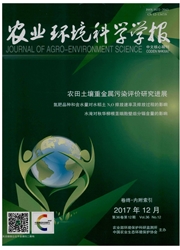

 中文摘要:
中文摘要:
通过对邯郸马头电厂、广州恒运电厂的2种脱硫灰以及广州恒运电厂脱硫灰与钾矿石高温焙烧产物进行了物理特性和化学成分分析,并在不同pH值下进行了浸出实验,对可溶的有效元素、微量元素特别是重金属的含量进行分析比较,对3种实验样品农业应用的安全有效性进行了研究评价。结果表明,3种样品的重金属As、Cr、Cu、Mo、Ni、Pb、Zn、Cd含量均远远小于国家标准,得出可以在农业上的安全使用;样品中的有效元素ca、Mg、Fe、Al、Na、Si的含量均在0.01%~1%之间,尤其是钾元素,实验浸出值在5%左右,可以在农业上得到有效的利用,因此在农业上应用有一定的有效性。
 英文摘要:
英文摘要:
Desulfurization residues from two power plants (Matou, Handan, Hebei, and Hengyun, Guangzhou, Guangdong)were studied, to- gether with the calcined product from Hengyun, after calcining with K-feldspar. The physical properties and chemical composition were determined. Leaching experiments at various pH were undertaken to find the soluble effective element composition, along with the trace element composition, especially for heavy metals. The purpose is to study the efficacy and safety of these residues for use in agriculture. As, Cr, Cu, Mo, Ni, Pb, Zn and Cd for all three samples were at concentrations below the National standard for use in agriculture. The effective element percer,t concentrations of Ca, Mg, Fe, Al, Na and Si were all between 0.01% and 1%. The leached concentration of K was up to 5%. These levels were beneficial in agriculture. The effective element and heavy metal concentrations all fell with increasing pH. Leaching of heavy metals and effective elements occurs most readily at low pH.
 同期刊论文项目
同期刊论文项目
 同项目期刊论文
同项目期刊论文
 期刊信息
期刊信息
